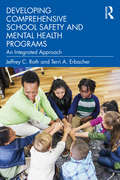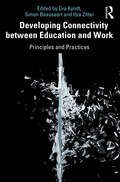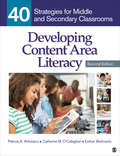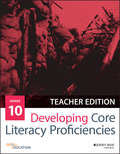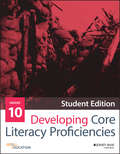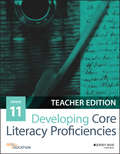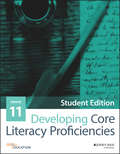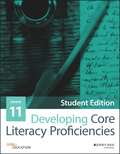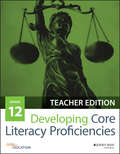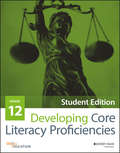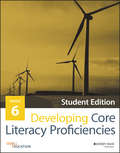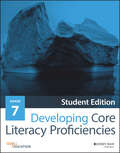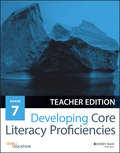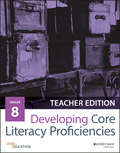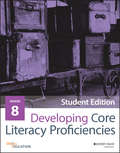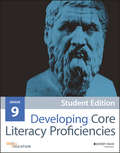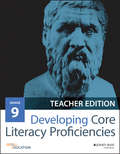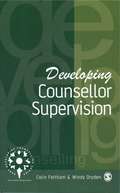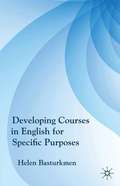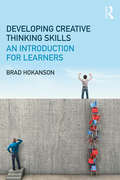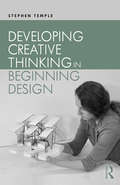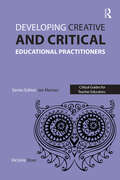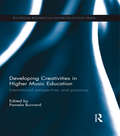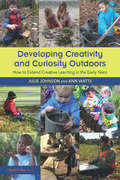- Table View
- List View
Developing Comprehensive School Safety and Mental Health Programs: An Integrated Approach
by Jeffrey C. Roth Terri A. ErbacherDeveloping Comprehensive School Safety and Mental Health Programs offers an integrated, long-term plan to create safe and supportive learning environments. This user-friendly guide illustrates how to develop, implement, evaluate, and sustain multiple evidence-based programs that work. This book informs school mental health professionals, administrators, and teachers about multi-tiered service delivery, organizational development, and facilitating the implementation process. It describes the complementary roles of school administrators, counselors, and school psychologists, providing school staff with time, resources, and ongoing support to strengthen their skills and sustain programs they have embraced. It expresses empathy and appreciation for teachers, advocating for their personal growth, professional collaboration, and stress management. School leaders, facilitators, and teams are provided the knowledge, skills, and long-term plans to effectively advocate, assess needs, select programs, train and encourage staff, provide resources, and implement, evaluate, and sustain desired goals.
Developing Connectivity between Education and Work: Principles and Practices
by Eva Kyndt Simon Beausaert Ilya ZitterFuture-oriented education needs to invest in the connectivity between learning and working in order to realise its full potential. This book presents guiding principles on how to build these successful connections. By taking an educational perspective and enriching it with insights from human resource development, this book explores the why, how and what of designing for connectivity. This edited volume presents the current knowledge about educational practices and principles that help to realise connectivity between learning and working experiences. Introducing the central perspectives of workplace learning and learning environments at the boundary of school and work, this book presents key research that examines how educators and professionals from organisations and schools can come together with the purpose of realising connectivity in educational programmes. Empirical research showcasing both theoretical and practical insights from real life cases are at the heart of this book. Considering the barriers to achieving connectivity, this book also focuses on how it can be achieved, with ideas and guidance about communication, design principles and best practices. Using carefully chosen international examples, this book is ideal reading for policy makers, practitioners and researchers looking to learn more about connecting learning and working experiences.
Developing Content Area Literacy: 40 Strategies for Middle and Secondary Classrooms
by Patricia A. Antonacci Esther Berkowitz Catherine M. O′CallaghanForty evidenced-based strategies for integrating literacy instruction into the content areas Providing unique content on assessment, differentiated instruction, technology, and reflective practice, Developing Content Area Literacy, Second Edition is designed to help busy middle school and secondary teachers meet the challenge of addressing the literacy learning needs of all students, including English language learners. Each of the 40 evidence-based strategies is organized around eight essential areas of literacy instruction: academic vocabulary, reading fluency, narrative text, informational text, media and digital literacies, informational writing, critical thinking, and independent learning. Each topic has five strategies from which to choose, giving teachers ample variety to meet the diverse needs of the classroom.
Developing Core Literacy Proficiencies, Grade 10
by Odell EducationThe Developing Core Literacy Proficiencies program is an integrated set of English Language Arts/Literacy units spanning grades 6-12 that provide student-centered instruction on a set of literacy proficiencies at the heart of the Common Core State Standards (CCSS). Reading Closely for Textual Details Making Evidence-Based Claims Making Evidence-Based Claims about Literary Technique (Grades 9-12) Researching to Deepen Understanding Building Evidence-Based Arguments The program approaches literacy through the development of knowledge, literacy skills, and academic habits. Throughout the activities, students develop their literacy along these three paths in an integrated, engaging, and empowering way. Knowledge: The texts and topics students encounter in the program have been carefully selected to expose them to rich and varied ideas and perspectives of cultural significance. These texts not only equip students with key ideas for participating knowledgeably in the important discussions of our time, but also contain the complexity of expression necessary for developing college- and career-ready literacy skills. Literacy Skills: The program articulates and targets instruction and assessment on twenty CCSS-aligned literacy skills ranging from “making inferences” to “reflecting critically.” Students focus on this set of twenty skills throughout the year and program, continually applying them in new and more sophisticated ways. Academic Habits: The program articulates twelve academic habits for students to develop, apply, and extend as they progress through the sequence of instruction. Instructional notes allow teachers to introduce and discuss academic habits such as “preparing” and “completing tasks” that are essential to students’ success in the classroom. The program materials include a comprehensive set of instructional sequences, teacher notes, handouts, assessments, rubrics, and graphic organizers designed to support students with a diversity of educational experiences and needs. The integrated assessment system, centered around the literacy skills and academic habits, allows for the coherent evaluation of student literacy development over the course of the year and vertically across all grade levels.
Developing Core Literacy Proficiencies, Grade 10
by Odell EducationThe Developing Core Literacy Proficiencies program is an integrated set of English Language Arts/Literacy units spanning grades 6-12 that provide student-centered instruction on a set of literacy proficiencies at the heart of the Common Core State Standards (CCSS). Reading Closely for Textual Details Making Evidence-Based Claims Making Evidence-Based Claims about Literary Technique (Grades 9-12) Researching to Deepen Understanding Building Evidence-Based Arguments The program approaches literacy through the development of knowledge, literacy skills, and academic habits. Throughout the activities, students develop their literacy along these three paths in an integrated, engaging, and empowering way. Knowledge: The texts and topics students encounter in the program have been carefully selected to expose them to rich and varied ideas and perspectives of cultural significance. These texts not only equip students with key ideas for participating knowledgeably in the important discussions of our time, but also contain the complexity of expression necessary for developing college- and career-ready literacy skills. Literacy Skills: The program articulates and targets instruction and assessment on twenty CCSS-aligned literacy skills ranging from “making inferences” to “reflecting critically.” Students focus on this set of twenty skills throughout the year and program, continually applying them in new and more sophisticated ways. Academic Habits: The program articulates twelve academic habits for students to develop, apply, and extend as they progress through the sequence of instruction. Instructional notes allow teachers to introduce and discuss academic habits such as “preparing” and “completing tasks” that are essential to students’ success in the classroom. The program materials include a comprehensive set of instructional sequences, teacher notes, handouts, assessments, rubrics, and graphic organizers designed to support students with a diversity of educational experiences and needs. The integrated assessment system, centered around the literacy skills and academic habits, allows for the coherent evaluation of student literacy development over the course of the year and vertically across all grade levels.
Developing Core Literacy Proficiencies, Grade 11
by Odell EducationThe Developing Core Literacy Proficiencies program is an integrated set of English Language Arts/Literacy units spanning grades 6-12 that provide student-centered instruction on a set of literacy proficiencies at the heart of the Common Core State Standards (CCSS). Reading Closely for Textual Details Making Evidence-Based Claims Making Evidence-Based Claims about Literary Technique (Grades 9-12) Researching to Deepen Understanding Building Evidence-Based Arguments The program approaches literacy through the development of knowledge, literacy skills, and academic habits. Throughout the activities, students develop their literacy along these three paths in an integrated, engaging, and empowering way. Knowledge: The texts and topics students encounter in the program have been carefully selected to expose them to rich and varied ideas and perspectives of cultural significance. These texts not only equip students with key ideas for participating knowledgeably in the important discussions of our time, but also contain the complexity of expression necessary for developing college- and career-ready literacy skills. Literacy Skills: The program articulates and targets instruction and assessment on twenty CCSS-aligned literacy skills ranging from “making inferences” to “reflecting critically.” Students focus on this set of twenty skills throughout the year and program, continually applying them in new and more sophisticated ways. Academic Habits: The program articulates twelve academic habits for students to develop, apply, and extend as they progress through the sequence of instruction. Instructional notes allow teachers to introduce and discuss academic habits such as “preparing” and “completing tasks” that are essential to students’ success in the classroom. The program materials include a comprehensive set of instructional sequences, teacher notes, handouts, assessments, rubrics, and graphic organizers designed to support students with a diversity of educational experiences and needs. The integrated assessment system, centered around the literacy skills and academic habits, allows for the coherent evaluation of student literacy development over the course of the year and vertically across all grade levels.
Developing Core Literacy Proficiencies, Grade 11
by Odell EducationThe Developing Core Literacy Proficiencies program is an integrated set of English Language Arts/Literacy units spanning grades 6-12 that provide student-centered instruction on a set of literacy proficiencies at the heart of the Common Core State Standards (CCSS). Reading Closely for Textual Details Making Evidence-Based Claims Making Evidence-Based Claims about Literary Technique (Grades 9-12) Researching to Deepen Understanding Building Evidence-Based Arguments The program approaches literacy through the development of knowledge, literacy skills, and academic habits. Throughout the activities, students develop their literacy along these three paths in an integrated, engaging, and empowering way. Knowledge: The texts and topics students encounter in the program have been carefully selected to expose them to rich and varied ideas and perspectives of cultural significance. These texts not only equip students with key ideas for participating knowledgeably in the important discussions of our time, but also contain the complexity of expression necessary for developing college- and career-ready literacy skills. Literacy Skills: The program articulates and targets instruction and assessment on twenty CCSS-aligned literacy skills ranging from “making inferences” to “reflecting critically.” Students focus on this set of twenty skills throughout the year and program, continually applying them in new and more sophisticated ways. Academic Habits: The program articulates twelve academic habits for students to develop, apply, and extend as they progress through the sequence of instruction. Instructional notes allow teachers to introduce and discuss academic habits such as “preparing” and “completing tasks” that are essential to students’ success in the classroom. The program materials include a comprehensive set of instructional sequences, teacher notes, handouts, assessments, rubrics, and graphic organizers designed to support students with a diversity of educational experiences and needs. The integrated assessment system, centered around the literacy skills and academic habits, allows for the coherent evaluation of student literacy development over the course of the year and vertically across all grade levels.
Developing Core Literacy Proficiencies, Grade 11
by Odell Odell EducationThe Developing Core Literacy Proficiencies program is an integrated set of English Language Arts/Literacy units spanning grades 6-12 that provide student-centered instruction on a set of literacy proficiencies at the heart of the Common Core State Standards (CCSS).
Developing Core Literacy Proficiencies, Grade 12
by Odell EducationThe Developing Core Literacy Proficiencies program is an integrated set of English Language Arts/Literacy units spanning grades 6-12 that provide student-centered instruction on a set of literacy proficiencies at the heart of the Common Core State Standards (CCSS). Reading Closely for Textual Details Making Evidence-Based Claims Making Evidence-Based Claims about Literary Technique (Grades 9-12) Researching to Deepen Understanding Building Evidence-Based Arguments The program approaches literacy through the development of knowledge, literacy skills, and academic habits. Throughout the activities, students develop their literacy along these three paths in an integrated, engaging, and empowering way. Knowledge: The texts and topics students encounter in the program have been carefully selected to expose them to rich and varied ideas and perspectives of cultural significance. These texts not only equip students with key ideas for participating knowledgeably in the important discussions of our time, but also contain the complexity of expression necessary for developing college- and career-ready literacy skills. Literacy Skills: The program articulates and targets instruction and assessment on twenty CCSS-aligned literacy skills ranging from “making inferences” to “reflecting critically.” Students focus on this set of twenty skills throughout the year and program, continually applying them in new and more sophisticated ways. Academic Habits: The program articulates twelve academic habits for students to develop, apply, and extend as they progress through the sequence of instruction. Instructional notes allow teachers to introduce and discuss academic habits such as “preparing” and “completing tasks” that are essential to students’ success in the classroom. The program materials include a comprehensive set of instructional sequences, teacher notes, handouts, assessments, rubrics, and graphic organizers designed to support students with a diversity of educational experiences and needs. The integrated assessment system, centered around the literacy skills and academic habits, allows for the coherent evaluation of student literacy development over the course of the year and vertically across all grade levels.
Developing Core Literacy Proficiencies, Grade 12
by Odell EducationThe Developing Core Literacy Proficiencies program is an integrated set of English Language Arts/Literacy units spanning grades 6-12 that provide student-centered instruction on a set of literacy proficiencies at the heart of the Common Core State Standards (CCSS). Reading Closely for Textual Details Making Evidence-Based Claims Making Evidence-Based Claims about Literary Technique (Grades 9-12) Researching to Deepen Understanding Building Evidence-Based Arguments The program approaches literacy through the development of knowledge, literacy skills, and academic habits. Throughout the activities, students develop their literacy along these three paths in an integrated, engaging, and empowering way. Knowledge: The texts and topics students encounter in the program have been carefully selected to expose them to rich and varied ideas and perspectives of cultural significance. These texts not only equip students with key ideas for participating knowledgeably in the important discussions of our time, but also contain the complexity of expression necessary for developing college- and career-ready literacy skills. Literacy Skills: The program articulates and targets instruction and assessment on twenty CCSS-aligned literacy skills ranging from “making inferences” to “reflecting critically.” Students focus on this set of twenty skills throughout the year and program, continually applying them in new and more sophisticated ways. Academic Habits: The program articulates twelve academic habits for students to develop, apply, and extend as they progress through the sequence of instruction. Instructional notes allow teachers to introduce and discuss academic habits such as “preparing” and “completing tasks” that are essential to students’ success in the classroom. The program materials include a comprehensive set of instructional sequences, teacher notes, handouts, assessments, rubrics, and graphic organizers designed to support students with a diversity of educational experiences and needs. The integrated assessment system, centered around the literacy skills and academic habits, allows for the coherent evaluation of student literacy development over the course of the year and vertically across all grade levels.
Developing Core Literacy Proficiencies, Grade 6
by Odell EducationThe Developing Core Literacy Proficiencies program is an integrated set of English Language Arts/Literacy units spanning grades 6-12 that provide student-centered instruction on a set of literacy proficiencies at the heart of the Common Core State Standards (CCSS). Reading Closely for Textual Details Making Evidence-Based Claims Making Evidence-Based Claims about Literary Technique (Grades 9-12) Researching to Deepen Understanding Building Evidence-Based Arguments The program approaches literacy through the development of knowledge, literacy skills, and academic habits. Throughout the activities, students develop their literacy along these three paths in an integrated, engaging, and empowering way. Knowledge: The texts and topics students encounter in the program have been carefully selected to expose them to rich and varied ideas and perspectives of cultural significance. These texts not only equip students with key ideas for participating knowledgeably in the important discussions of our time, but also contain the complexity of expression necessary for developing college- and career-ready literacy skills. Literacy Skills: The program articulates and targets instruction and assessment on twenty CCSS-aligned literacy skills ranging from “making inferences” to “reflecting critically.” Students focus on this set of twenty skills throughout the year and program, continually applying them in new and more sophisticated ways. Academic Habits: The program articulates twelve academic habits for students to develop, apply, and extend as they progress through the sequence of instruction. Instructional notes allow teachers to introduce and discuss academic habits such as “preparing” and “completing tasks” that are essential to students’ success in the classroom. The program materials include a comprehensive set of instructional sequences, teacher notes, handouts, assessments, rubrics, and graphic organizers designed to support students with a diversity of educational experiences and needs. The integrated assessment system, centered around the literacy skills and academic habits, allows for the coherent evaluation of student literacy development over the course of the year and vertically across all grade levels.
Developing Core Literacy Proficiencies, Grade 6
by Odell EducationThe Developing Core Literacy Proficiencies program is an integrated set of English Language Arts/Literacy units spanning grades 6-12 that provide student-centered instruction on a set of literacy proficiencies at the heart of the Common Core State Standards (CCSS). Reading Closely for Textual Details Making Evidence-Based Claims Making Evidence-Based Claims about Literary Technique (Grades 9-12) Researching to Deepen Understanding Building Evidence-Based Arguments The program approaches literacy through the development of knowledge, literacy skills, and academic habits. Throughout the activities, students develop their literacy along these three paths in an integrated, engaging, and empowering way. Knowledge: The texts and topics students encounter in the program have been carefully selected to expose them to rich and varied ideas and perspectives of cultural significance. These texts not only equip students with key ideas for participating knowledgeably in the important discussions of our time, but also contain the complexity of expression necessary for developing college- and career-ready literacy skills. Literacy Skills: The program articulates and targets instruction and assessment on twenty CCSS-aligned literacy skills ranging from “making inferences” to “reflecting critically.” Students focus on this set of twenty skills throughout the year and program, continually applying them in new and more sophisticated ways. Academic Habits: The program articulates twelve academic habits for students to develop, apply, and extend as they progress through the sequence of instruction. Instructional notes allow teachers to introduce and discuss academic habits such as “preparing” and “completing tasks” that are essential to students’ success in the classroom. The program materials include a comprehensive set of instructional sequences, teacher notes, handouts, assessments, rubrics, and graphic organizers designed to support students with a diversity of educational experiences and needs. The integrated assessment system, centered around the literacy skills and academic habits, allows for the coherent evaluation of student literacy development over the course of the year and vertically across all grade levels.
Developing Core Literacy Proficiencies, Grade 7
by Odell EducationThe Developing Core Literacy Proficiencies program is an integrated set of English Language Arts/Literacy units spanning grades 6-12 that provide student-centered instruction on a set of literacy proficiencies at the heart of the Common Core State Standards (CCSS). Reading Closely for Textual Details Making Evidence-Based Claims Making Evidence-Based Claims about Literary Technique (Grades 9-12) Researching to Deepen Understanding Building Evidence-Based Arguments The program approaches literacy through the development of knowledge, literacy skills, and academic habits. Throughout the activities, students develop their literacy along these three paths in an integrated, engaging, and empowering way. Knowledge: The texts and topics students encounter in the program have been carefully selected to expose them to rich and varied ideas and perspectives of cultural significance. These texts not only equip students with key ideas for participating knowledgeably in the important discussions of our time, but also contain the complexity of expression necessary for developing college- and career-ready literacy skills. Literacy Skills: The program articulates and targets instruction and assessment on twenty CCSS-aligned literacy skills ranging from “making inferences” to “reflecting critically.” Students focus on this set of twenty skills throughout the year and program, continually applying them in new and more sophisticated ways. Academic Habits: The program articulates twelve academic habits for students to develop, apply, and extend as they progress through the sequence of instruction. Instructional notes allow teachers to introduce and discuss academic habits such as “preparing” and “completing tasks” that are essential to students’ success in the classroom. The program materials include a comprehensive set of instructional sequences, teacher notes, handouts, assessments, rubrics, and graphic organizers designed to support students with a diversity of educational experiences and needs. The integrated assessment system, centered around the literacy skills and academic habits, allows for the coherent evaluation of student literacy development over the course of the year and vertically across all grade levels.
Developing Core Literacy Proficiencies, Grade 7
by Odell EducationThe Developing Core Literacy Proficiencies program is an integrated set of English Language Arts/Literacy units spanning grades 6-12 that provide student-centered instruction on a set of literacy proficiencies at the heart of the Common Core State Standards (CCSS). Reading Closely for Textual Details Making Evidence-Based Claims Making Evidence-Based Claims about Literary Technique (Grades 9-12) Researching to Deepen Understanding Building Evidence-Based Arguments The program approaches literacy through the development of knowledge, literacy skills, and academic habits. Throughout the activities, students develop their literacy along these three paths in an integrated, engaging, and empowering way. Knowledge: The texts and topics students encounter in the program have been carefully selected to expose them to rich and varied ideas and perspectives of cultural significance. These texts not only equip students with key ideas for participating knowledgeably in the important discussions of our time, but also contain the complexity of expression necessary for developing college- and career-ready literacy skills. Literacy Skills: The program articulates and targets instruction and assessment on twenty CCSS-aligned literacy skills ranging from “making inferences” to “reflecting critically.” Students focus on this set of twenty skills throughout the year and program, continually applying them in new and more sophisticated ways. Academic Habits: The program articulates twelve academic habits for students to develop, apply, and extend as they progress through the sequence of instruction. Instructional notes allow teachers to introduce and discuss academic habits such as “preparing” and “completing tasks” that are essential to students’ success in the classroom. The program materials include a comprehensive set of instructional sequences, teacher notes, handouts, assessments, rubrics, and graphic organizers designed to support students with a diversity of educational experiences and needs. The integrated assessment system, centered around the literacy skills and academic habits, allows for the coherent evaluation of student literacy development over the course of the year and vertically across all grade levels.
Developing Core Literacy Proficiencies, Grade 8
by Odell EducationThe Developing Core Literacy Proficiencies program is an integrated set of English Language Arts/Literacy units spanning grades 6-12 that provide student-centered instruction on a set of literacy proficiencies at the heart of the Common Core State Standards (CCSS). Reading Closely for Textual Details Making Evidence-Based Claims Making Evidence-Based Claims about Literary Technique (Grades 9-12) Researching to Deepen Understanding Building Evidence-Based Arguments The program approaches literacy through the development of knowledge, literacy skills, and academic habits. Throughout the activities, students develop their literacy along these three paths in an integrated, engaging, and empowering way. Knowledge: The texts and topics students encounter in the program have been carefully selected to expose them to rich and varied ideas and perspectives of cultural significance. These texts not only equip students with key ideas for participating knowledgeably in the important discussions of our time, but also contain the complexity of expression necessary for developing college- and career-ready literacy skills. Literacy Skills: The program articulates and targets instruction and assessment on twenty CCSS-aligned literacy skills ranging from “making inferences” to “reflecting critically.” Students focus on this set of twenty skills throughout the year and program, continually applying them in new and more sophisticated ways. Academic Habits: The program articulates twelve academic habits for students to develop, apply, and extend as they progress through the sequence of instruction. Instructional notes allow teachers to introduce and discuss academic habits such as “preparing” and “completing tasks” that are essential to students’ success in the classroom. The program materials include a comprehensive set of instructional sequences, teacher notes, handouts, assessments, rubrics, and graphic organizers designed to support students with a diversity of educational experiences and needs. The integrated assessment system, centered around the literacy skills and academic habits, allows for the coherent evaluation of student literacy development over the course of the year and vertically across all grade levels.
Developing Core Literacy Proficiencies, Grade 8
by Odell EducationThe Developing Core Literacy Proficiencies program is an integrated set of English Language Arts/Literacy units spanning grades 6-12 that provide student-centered instruction on a set of literacy proficiencies at the heart of the Common Core State Standards (CCSS). Reading Closely for Textual Details Making Evidence-Based Claims Making Evidence-Based Claims about Literary Technique (Grades 9-12) Researching to Deepen Understanding Building Evidence-Based Arguments The program approaches literacy through the development of knowledge, literacy skills, and academic habits. Throughout the activities, students develop their literacy along these three paths in an integrated, engaging, and empowering way. Knowledge: The texts and topics students encounter in the program have been carefully selected to expose them to rich and varied ideas and perspectives of cultural significance. These texts not only equip students with key ideas for participating knowledgeably in the important discussions of our time, but also contain the complexity of expression necessary for developing college- and career-ready literacy skills. Literacy Skills: The program articulates and targets instruction and assessment on twenty CCSS-aligned literacy skills ranging from “making inferences” to “reflecting critically.” Students focus on this set of twenty skills throughout the year and program, continually applying them in new and more sophisticated ways. Academic Habits: The program articulates twelve academic habits for students to develop, apply, and extend as they progress through the sequence of instruction. Instructional notes allow teachers to introduce and discuss academic habits such as “preparing” and “completing tasks” that are essential to students’ success in the classroom. The program materials include a comprehensive set of instructional sequences, teacher notes, handouts, assessments, rubrics, and graphic organizers designed to support students with a diversity of educational experiences and needs. The integrated assessment system, centered around the literacy skills and academic habits, allows for the coherent evaluation of student literacy development over the course of the year and vertically across all grade levels.
Developing Core Literacy Proficiencies, Grade 9
by Odell EducationThe Developing Core Literacy Proficiencies program is an integrated set of English Language Arts/Literacy units spanning grades 6-12 that provide student-centered instruction on a set of literacy proficiencies at the heart of the Common Core State Standards (CCSS). Reading Closely for Textual Details Making Evidence-Based Claims Making Evidence-Based Claims about Literary Technique (Grades 9-12) Researching to Deepen Understanding Building Evidence-Based Arguments The program approaches literacy through the development of knowledge, literacy skills, and academic habits. Throughout the activities, students develop their literacy along these three paths in an integrated, engaging, and empowering way. Knowledge: The texts and topics students encounter in the program have been carefully selected to expose them to rich and varied ideas and perspectives of cultural significance. These texts not only equip students with key ideas for participating knowledgeably in the important discussions of our time, but also contain the complexity of expression necessary for developing college- and career-ready literacy skills. Literacy Skills: The program articulates and targets instruction and assessment on twenty CCSS-aligned literacy skills ranging from “making inferences” to “reflecting critically.” Students focus on this set of twenty skills throughout the year and program, continually applying them in new and more sophisticated ways. Academic Habits: The program articulates twelve academic habits for students to develop, apply, and extend as they progress through the sequence of instruction. Instructional notes allow teachers to introduce and discuss academic habits such as “preparing” and “completing tasks” that are essential to students’ success in the classroom. The program materials include a comprehensive set of instructional sequences, teacher notes, handouts, assessments, rubrics, and graphic organizers designed to support students with a diversity of educational experiences and needs. The integrated assessment system, centered around the literacy skills and academic habits, allows for the coherent evaluation of student literacy development over the course of the year and vertically across all grade levels.
Developing Core Literacy Proficiencies, Grade 9
by Odell EducationThe Developing Core Literacy Proficiencies program is an integrated set of English Language Arts/Literacy units spanning grades 6-12 that provide student-centered instruction on a set of literacy proficiencies at the heart of the Common Core State Standards (CCSS). Reading Closely for Textual Details Making Evidence-Based Claims Making Evidence-Based Claims about Literary Technique (Grades 9-12) Researching to Deepen Understanding Building Evidence-Based Arguments The program approaches literacy through the development of knowledge, literacy skills, and academic habits. Throughout the activities, students develop their literacy along these three paths in an integrated, engaging, and empowering way. Knowledge: The texts and topics students encounter in the program have been carefully selected to expose them to rich and varied ideas and perspectives of cultural significance. These texts not only equip students with key ideas for participating knowledgeably in the important discussions of our time, but also contain the complexity of expression necessary for developing college- and career-ready literacy skills. Literacy Skills: The program articulates and targets instruction and assessment on twenty CCSS-aligned literacy skills ranging from “making inferences” to “reflecting critically.” Students focus on this set of twenty skills throughout the year and program, continually applying them in new and more sophisticated ways. Academic Habits: The program articulates twelve academic habits for students to develop, apply, and extend as they progress through the sequence of instruction. Instructional notes allow teachers to introduce and discuss academic habits such as “preparing” and “completing tasks” that are essential to students’ success in the classroom. The program materials include a comprehensive set of instructional sequences, teacher notes, handouts, assessments, rubrics, and graphic organizers designed to support students with a diversity of educational experiences and needs. The integrated assessment system, centered around the literacy skills and academic habits, allows for the coherent evaluation of student literacy development over the course of the year and vertically across all grade levels.
Developing Counsellor Supervision: SAGE Publications (Developing Counselling series #2)
by Windy Dryden Colin FelthamSeminars by Professor Windy Dryden. See the man live and in action. To find out more and to book your place go to www. cityminds. com ________________________________________ `It is a fairly well established clich[ac]e that while supervision is recognised as a crucial component of good practice in psychotherapy and counselling, there is correspondingly little written about it. . . [this book is] a good step in redressing the balance. . . It is a practical, didactic and generic view of how to do supervision. . . giving a fairly comprehensive account of 30 of the formal skills that all supervisors probably use whether consciously or not. . . The book discusses each of the skills, giving examples as well as practical suggestions as to how to approach difficult issues. . . directed principally at counsellors, it is a book to dip into when faced with a panic about a specific issue' - Therapeutic Communities Supervision is a professional and ethical necessity for all counsellors, providing them with consultative and supportive aid while protecting clients from potential abuse - yet relatively little has been written on the subject. This volume aims to redress that balance. Encouraging, yet sensitive to the difficult issues that frequently arise in supervision, the book contains practical suggestions, plus useful appendices, to help practising and trainee supervisors develop and enhance the skills they need to be successful in their work. The authors cover such key areas as creating a supervisory alliance, fostering the supervisory relationship, the use of tape-recording, highlighting supervisees' strengths and weaknesses, and protecting the client and counsellor.
Developing Courses in English for Specific Purposes
by Helen BasturkmenPresented in two parts, this book firstly introduces core considerations in ESP course development drawing on examples from a wide range of ESP and EAP courses. Secondly four case studies show how experienced ESP teachers and course developers went about developing courses to meet the needs of their particular learners.
Developing Creative Thinking Skills: An Introduction for Learners
by Brad HokansonBased on over fifteen years of groundbreaking research, Developing Creative Thinking Skills helps learners demonstrably increase their own creative thinking skills. Focusing on divergent thinking, twelve inventive chapters build one’s capacity to generate a wide range of ideas, both as an individual and as a collaborator. This innovative textbook outlines a semester-long structure for the development of creative thinking skills and can easily be utilized as a self-directed format for those learning outside of a classroom. Readers are stimulated to maximize their own creativity through active exercises, challenges to personal limits and assumptions, and ideas that can help create powerful habits of variance.
Developing Creative Thinking in Beginning Design
by Stephen TempleLearning to think and act creatively is a requisite fundamental aspect of design education for architectural and interior design as well as industrial and graphic design. Development of creative capacities must be encountered early in design education for beginning students to become self-actualized as skillful designers. With chapters written by beginning design instructors, Developing Creative Thinking in Beginning Design addresses issues that contribute to deficiencies in teaching creativity in contemporary beginning design programs. Where traditional pedagogies displace creative thinking by placing conceptual abstractions above direct experiential engagement, the approaches presented in this book set forth alternative pedagogies that mitigate student fears and misconceptions to reveal the potency of authentic encounters for initiating creative transformational development. These chapters challenge design pedagogy to address such issues as the spatial body, phenomenological thinking, making as process, direct material engagement and its temporal challenges, creative decision making and the wickedness of design, and the openness of the creative design problem. In doing so, this book sets out to give greater depth to first design experiences and more effectively enable the breadth and depth of the teacher–student relationship as a means of helping your students develop the capacity for long-term self-transformation.
Developing Creative and Critical Educational Practitioners (Critical Guides for Teacher Educators)
by Victoria DoorThis book encourages teacher educators to promote flexible and sustainable practice in their students, enabling them to flourish within an ever-changing educational environment. Research from the UK and US strongly indicates that a coherent theory-practice approach to teacher preparation is key. The book outlines what such a framework can look like, a rationale for it, and how it can work in practice for groups and individuals. It explores the notions of the reflexive teacher, creativity as a basis for practice, and criticality as a necessary underpinning for educators. The discussion draws on the research and experiences of teacher educators, student teachers and in-service teachers, from NQTs to Lead Practitioners and senior management. It proposes the foundational understanding for beginning teachers to join a community of practice based on scholarship, professionalism and ethical practice.This book is part of the successful Critical Guides for Teacher Educators series edited by Ian Menter.
Developing Creativities in Higher Music Education: International Perspectives and Practices (Routledge Research in Higher Education)
by Pamela BurnardThis is the first book to critically address the issue of how we can enhance and develop creativities in higher music education. It features new international, richly diverse perspectives on the nature and practice of creativities in different cultural and institutional contexts, in varying roles and in response to diverse professional pressures and expectations of artistic and educational achievement. This compelling and provocative book combines powerful social and educational commentaries and examples drawn from international sources based on original practices and experience of a diversity of creativities. The authors provide an important contribution by drawing attention to what is at the heart of all music and how we can understand and foster these multiple creativities at an individual and institutional level. It features new analyses of the question of creativities in higher music education, and offers illustrative and innovative examples of adaptive learning environments for teaching and learning creatively, considering the broader issue of the role of creativities in relation to educational policy in the context of increasingly interventionist governments and rapidly paced educational change. Topics covered include: -the conceptual tools for people to think about and debate multiple creativities -the role of creativities in higher music education-how musicians can develop multiple creativities in new ways -new approaches to teaching and learning for multiple creativities -what constitute leadership creativities in conservatoires and music departments-creativities at the interface of institutional learning cultures-assessing the multiple creativities of music. Developing Creativities in Higher Music Education offers a multi-disciplinary research and practice focus, which will be essential reading for anyone involved in higher education and industry sectors. The book will appeal to academics and practitioners in music, researchers, instrumental and vocal teachers, curriculum and policy developers and institutional managers who want to enrich the higher education experiences of their students and enable them to develop more of their creative potential. It is also ideal reading for undergraduate and postgraduate students of music education who are looking for an authoritative selection of writings that define the fields of musical creativities in one comprehensive volume.
Developing Creativity and Curiosity Outdoors: How to Extend Creative Learning in the Early Years
by Julie Johnson Ann WattsThis accessible guide will inform, prompt and inspire practitioners as they develop their own creativity and seize the rich opportunities offered by outdoor environments to cultivate and encourage the creative skills of the young children in their care. Including information on Forest School, Developing Creativity and Curiosity Outdoors builds on theories of creative learning and development, and offers a wealth of ideas and activities for application in a range of outdoor settings. From designing and building structures, to making music and exploring colour, shape and pattern, this book illustrates how engagement in and with the natural world might extend children’s creative development, encouraging them to speak, listen, move freely, play and learn. Case studies demonstrate good practice and each chapter concludes with questions, encouraging the reader to reflect on and develop their own practice. Practical ideas can be adapted for use in more urban environments, and further reading, online resources and lists of suppliers make Developing Creativity and Curiosity Outdoors an essential resource for those looking to maximise the natural curiosity of children. This book will give early years practitioners and students the confidence and knowledge they need to embark on an exciting journey of outdoor discovery with young children.
